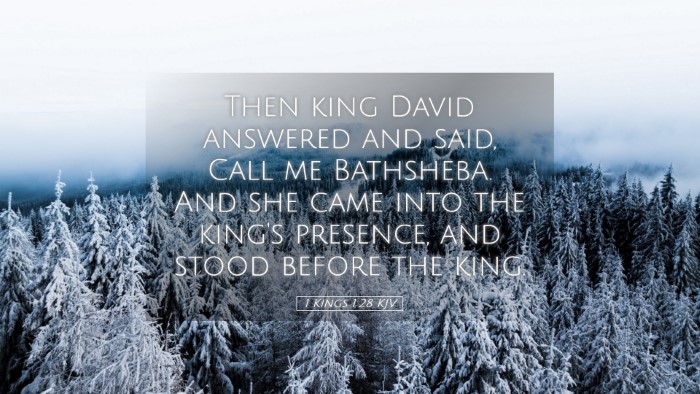Commentary on 1 Kings 1:28
1 Kings 1:28 states: "Then King David answered and said, Call me Bathsheba. And she came into the king's presence and stood before the king." This verse marks a significant moment in the narrative of David's later years, showcasing themes of authority, legitimacy, and the fulfilling of God's promises.
Introduction
This commentary synthesizes insights from notable public domain sources including Matthew Henry, Albert Barnes, and Adam Clarke, focusing on the implications and theological significance of King David's actions in this verse.
Contextual Background
The events surrounding this verse take place towards the end of King David's life, where a struggle for succession emerges, primarily between Adonijah and Solomon. David’s response to call Bathsheba reflects a strategic and necessary action in safeguarding the future of the Davidic line.
The Role of Bathsheba
Bathsheba is not only David's wife but also the mother of Solomon, who was chosen to be the next king. Her presence is critical at this moment.
- Political Significance: Bathsheba's position allows her to influence the king's decisions regarding the succession.
- Symbol of Divine Choice: Her calling signifies God's providential plan being unfolded, where Solomon, known for wisdom, is to ascend the throne.
The Act of Calling Bathsheba
David’s command to summon Bathsheba is laden with implications.
- Authority and Leadership: By calling her to him, David reasserts his authority as king, initiating dialogue concerning the future leadership of Israel.
- Recognition of Her Importance: Matthew Henry points out that offering her place beside him in this crucial moment acknowledges her pivotal role.
- Response to Confusion: The nation is in a state of confusion regarding the throne. Bathsheba’s summoning acts to clarify and stabilize the situation.
Theological Implications
This narrative reflects broader themes in the scripture and God’s overarching sovereignty.
God's Sovereign Will
David's awareness of the need to set Solomon on the throne speaks volumes about divine purpose.
- Fulfillment of Prophecy: The choice of Solomon fulfills God’s promises to David regarding his lineage.
- Divine Intervention: Albert Barnes emphasizes that God orchestrates events leading to Solomon's anointment despite the presence of rivals.
Leadership and Legacy
David’s final acts as king provide a model for contemporary leaders in the Church and society.
- Succession Planning: Leaders must recognize their role in preparing successors, ensuring the legacy of godliness continues.
- Involving Wise Counsel: Engaging figures of wisdom (like Bathsheba) fosters unity and obedience to God’s will.
Conclusion
In 1 Kings 1:28, we find more than a simple narrative; it is a manifestation of God's providential work. As pastors, students, and theologians reflect on this verse, it is essential to see the harmony between divine sovereignty and human agency. The calling of Bathsheba not only advances the narrative of succession but serves as a vital lesson in leadership dynamics, faithfulness, and the unfolding of God’s promises throughout Scripture.
As we contemplate the implications of David’s actions, let us also be mindful of how we embrace roles within our communities, perpetuating the legacy of faithfulness and obedience to God’s calling.


